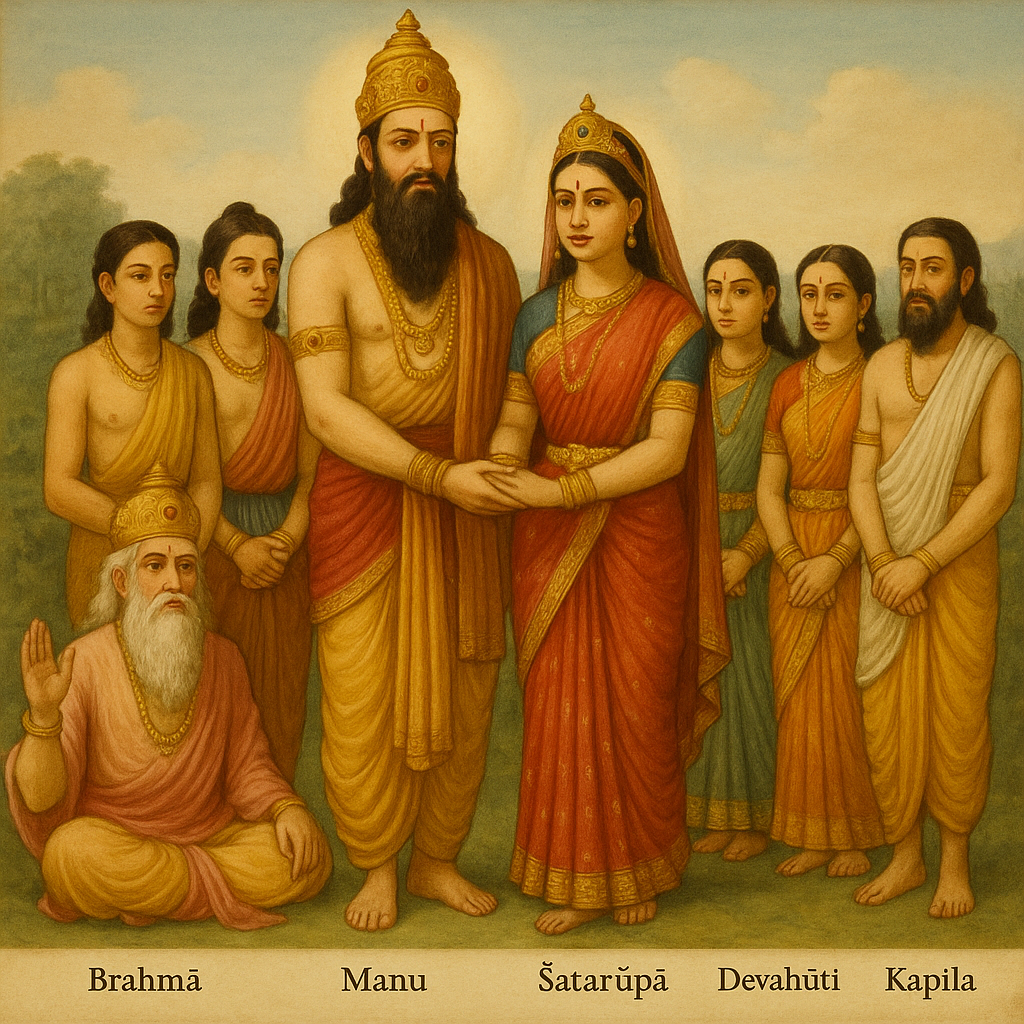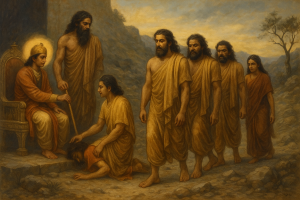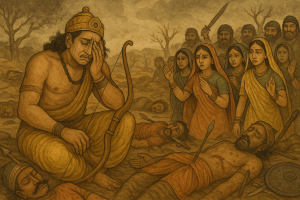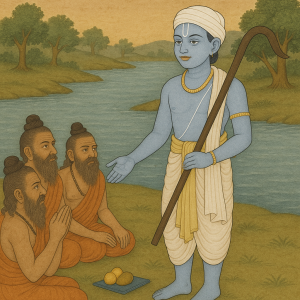Origin of the Story: Harivaṁśa Purāṇa – Adi-parva, Chapters 11–15
Manu – The Progenitor of Humanity
After bestowing Brahmā with divine vision and knowledge, Lord Nārāyaṇa, the Supreme Lord, inspired him to further the process of universal creation. In this divine unfolding, Brahmā brought forth Manu, the first monarch and father of mankind.
This Manu—Svāyambhuva Manu—is the first of the fourteen Manus who appear in every day of Brahmā (a kalpa). Entrusted with the stewardship of humanity, Manu ruled the world under the Lord’s divine guidance, maintaining the cosmic order through Dharma.
The Marriage of Svāyambhuva Manu and Śatarūpā
Brahmā created Śatarūpā, a chaste, pure, and beautiful female form. She became the wife of Svāyambhuva Manu, and together they became the progenitors of the human race.
Their union produced two sons—Priyavrata and Uttānapāda—and three daughters: Ākūti, Devahūti, and Prasūti. These daughters married powerful sages and gave rise to illustrious dynasties that shaped the destiny of gods and men alike.
Ākūti and the Incarnation of Yajña
Ākūti married the sage Ruci. From their union was born Yajña, an incarnation of Lord Viṣṇu. Yajña descended to uphold Dharma and to guide humanity in sacrifice and divine duties. He was accompanied by twelve sons known as the Yāmas, who assisted in maintaining cosmic order.
Devahūti and the Birth of Kapila
Devahūti was wed to the noble sage Kardama Muni. From their union appeared Kapila Muni, an incarnation of Lord Viṣṇu. Kapila taught his mother the profound truths of Sāṅkhya philosophy, revealing the secrets of detachment from matter and the path of surrender to the Supreme Lord.
Prasūti and the Progenitor Dakṣa
Prasūti was married to Dakṣa, a powerful Prajāpati and mind-born son of Brahmā. From them were born many daughters who were later married to sages, giving rise to various divine and worldly races—including demigods, demons, humans, and celestial beings.
Through these sacred unions, the tapestry of creation unfolded.
Priyavrata and Uttānapāda – Guardians of the Earth
The sons of Manu, Priyavrata and Uttānapāda, became powerful kings who ruled with wisdom and devotion.
Priyavrata, blessed by the Supreme Lord, ruled the seven dvīpas (island continents) and illuminated the world by following the sun in a divine chariot—bringing day to those lands plunged in night.
Uttānapāda became the father of Dhruva Mahārāja, a child-devotee celebrated for his intense austerities and unwavering devotion to Lord Viṣṇu. Dhruva’s life and teachings would inspire millions, and his story is glorified in the Śrīmad Bhāgavatam.
The Expansion of the Manu Dynasty
From this sacred lineage arose many righteous kings—each a protector of Dharma and a servant of the Lord. Among their descendants appeared some of the greatest names in Vedic history:
- Ikṣvāku, the founder of the Solar dynasty.
- Yadu, from whom the Yādava dynasty emerged.
- Puru, originator of the Paurava line.
- Ambarīṣa, the pure-hearted devotee of Lord Viṣṇu.
- Bhagiratha, who brought the sacred Gaṅgā to Earth.
- Lord Rāmacandra, the ideal king and incarnation of the Lord in the Ikṣvāku line.
- Śrī Kṛṣṇa, the Supreme Personality of Godhead Himself, born in the Yādava dynasty.
Divine Purpose in Kingship
Though these rulers governed vast lands and oceans, they were never driven by material ambition. They understood themselves as humble instruments of the Lord, entrusted with the sacred duty to protect Dharma, support Vedic sacrifices, and promote devotion among their citizens.
The Vedic concept of kingship was not about personal gain, but about selfless service—reflecting the Lord’s own protective and nurturing nature.
Lessons to Be Learned:
- The Lord guides creation through pure-hearted devotees, such as Manu and his descendants.
- Sacred family lines act as stewards of Dharma, transmitting divine wisdom through generations.
- Women play a vital role in Vedic society—as mothers of sages, kings, and even divine incarnations.
- Every role has value—whether king, sage, householder, or mother, all can attain perfection through sincere devotion.
- We are part of a sacred lineage—from Brahmā to Manu, through sages and kings, down to us—each of us called to serve and uphold Dharma.



